Transforming Lives
Better Rice for a Food-Secure Senegal
“I stopped cultivating rice several years ago because it just didn’t grow well,” said farmer Mamadou Coulibaly. “When I learned about NERICA from USAID, I took up rice production again.”
New Rice for Africa, or NERICA, is a hardy, high-yielding rice varietal that USAID is helping bring to farmers, including Coulibaly. Through the United States' flagship food security initiative, Feed the Future, USAID works with grassroots organizations and producer cooperatives to make NERICA available on a large scale in Senegal to increase rice production, and in turn, improve families’ food security and incomes.
After acquiring NERICA, Coulibaly said, “Last year I sold my rice seeds for more than 1 million francs ($2,000) and used my earnings to finish building my house and to buy a motorized plough and some cattle.”
Rice is a staple food in Senegal. Yet, in the south, irrigation for lowland rice is available in just a few areas. Historically, traditional rain-fed rice varieties and poor seed stock have led to meager yields of about one ton per hectare, which means farmers can’t grow enough to meet their family’s needs. In response to this challenge, USAID introduced NERICA, developed by Africa Rice.
Coulibaly said he is happy to be growing rice again, both seed for resale and paddy rice to feed his family. In 2010, he planted 2.5 hectares and harvested almost six tons. This also makes his wife Coumbayel very happy.
Michel Dorlean, a Haitian horticulturalist, grew up learning the family business of planting and growing flowers on hillside plots in his mountainous hometown of Furcy. Despite all the intensive work that goes into cultivating flowers, Dorlean and many other local flower producers struggled each year to reach their full earning potential. Today, thanks to assistance from Feed the Future, Dorlean is the president of a flower growers’ association in Furcy that generates US$18,000 per year. The project, implemented through USAID, is teaching smallholder farmers like Dorlean and his association how to use greenhouse agriculture to produce a higher quantity and quality of crops on smaller areas of land.
With an estimated 52 million cattle, 36 million sheep, 35 million goats and 5 million camels in 2009, Ethiopia has Africa’s largest livestock population. Pastoralist communities are highly dependent on income from livestock to pay for food, health services and school fees. Since 2005, USAID has supported the Global Livestock Collaborative Research Support Program to create a National Livestock Market Information System (NLMIS) in Ethiopia. The NLMIS helps Ethiopian pastoralists make better decisions on when to sell their livestock and earn increased income during times of economic hardship.
The herders of south-central Iraq have traditionally let their sheep graze on the land. But grass and reeds are scarce and the animals are often small when taken to market. Ahmad Alsaabari, an engineer by training, had read about the success of Western foodlots and recognized the opportunity when the U.S. Agency for International Development (USAID) proposed founding of a demonstration facility in Babil Province, where lambs are considered among the best in Iraq.
Women in rural Liberia are often unaware that Liberian divorce law grants them the right to half of all property amassed during marriage. Even if they know about the law, many women are deterred by the high costs and social stigma associated with taking a case to formal courts. With support from USAID, the Carter Center and Catholic Justice and Peace Commission now support 45 community legal advisors in seven counties around Liberia. Approximately half of all cases involve female clients. Through this program, USAID is helping to make the rule of law a reality for ordinary Liberians, often for the first time.
In a small village in southeastern Madagascar, a group of 20 single women are working together to increase their incomes and their independence. For the past two years, they have benefited from a USAID program to improve food security and nutrition among nearly 100,000 vulnerable households.
The Tajikistan Stability Enhancement Program builds and repairs rural infrastructure to develop targeted agricultural value chains and contribute to overall stability. During the summer growing season, the Tajikistan Stability Enhancement Program, a USAID-funded activity operating in the Tavildara Valley since 2009, has rehabilitated the defunct irrigation canal in Argankul, jumpstarting production and allowing farmers like Jumabek Begov to produce enough food to eat and surplus potatoes to sell.
When Palestinian students graduate, they can be proud in the knowledge that they have completed their formal studies in a system of education recognized throughout the Middle East for its high quality. But when the graduation celebrations are over, Palestinian students face the same question that students all around the world face: What can I do now?
Jenin Young Women’s Club (JYWC) is providing new opportunities of growth and personal development for girls and young women of Jenin through a safe and enriching environment for extra-curricular activities. A $76,610 grant from USAID's Civic Engagement Program helped the club acquire better equipment and resources including the first gym for women and a computer lab which is now being used to teach the club’s members new computer science skills.
Most notably, the grant funded the creation of the club’s all women football team, still not a common phenomenon in the Northern West Bank. This ambitious group of young women now participates in the Palestinian Women’s Football League and is supported by the Palestinian Football Federation.
Hana Masoud’s life changed when she joined a USAID health development initiative in her village. Once a jobless graduate, she has grown into an internationally-recognized youth leader. “I learned that each person has something to give,” she says, “and it was my duty to look for these things in the community.”
Her chance came when USAID began working in Burqa, a northern West Bank village. Using the Champion Community approach, USAID brings together Palestinians and their clinics to identify and address local health priorities. Hana’s job was to encourage residents to join in.
As a teacher in rural Kenya, Dr. Nduku Kilonzo never thought she would become involved in women‟s health, gender issues, and HIV. However, it was during her time as an educator in the 1990s when she began to realize disparities that threatened the health and well-being of her female students. “Women were looking after the sick or couldn‟t afford to send their daughters to school because they were spending money on health care,” she recalls.
Pages
Last updated: September 16, 2012



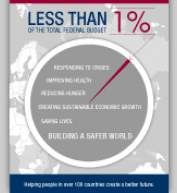
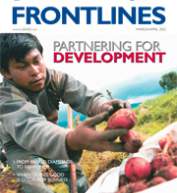



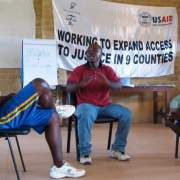
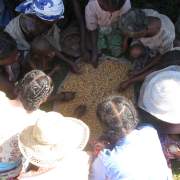
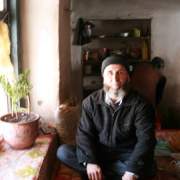
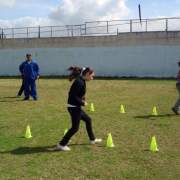
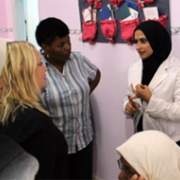
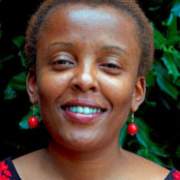
Comment
Make a general inquiry or suggest an improvement.